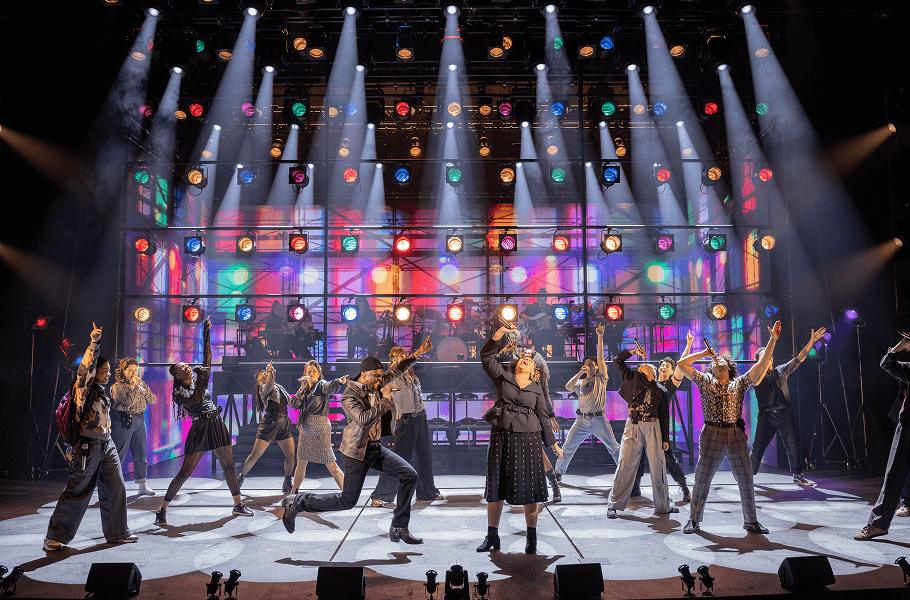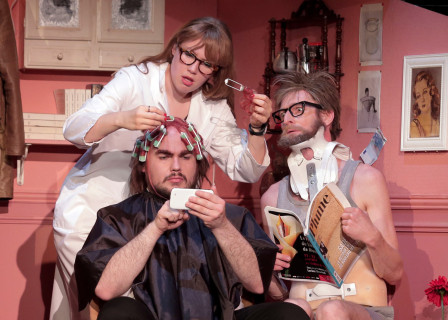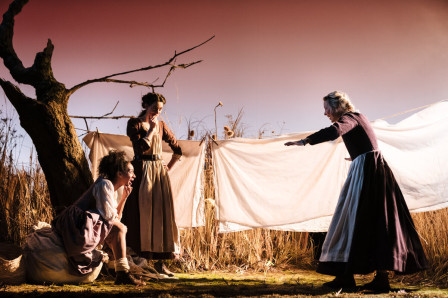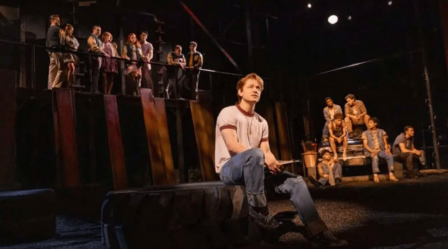Review: JUST FOR ONE DAY at Shaftesbury Theatre
Just For One Day is a showy, sentimental jukebox musical which makes only half-hearted attempts to address problematic elements of its subject matter. Somehow,it simultaneously has no plot, and too much going on. Despite this, though, it absolutely won me over.
 Just For One Day at the Shaftesbury Theatre.
Just For One Day at the Shaftesbury Theatre.
Perhaps I’m just a sucker for a belted-out 80s anthem- these make up the bulk of JFOD’s score, as the music is all songs by artists who performed on Band Aid or at Live Aid (the show’s first act focusses on the charity single, the second on the charity concert). The cast certainly look like they’re having a blast performing some of the greatest songs in pop and rock history. Their enthusiasm is infectious, none more so than when Freddie Love, having been mostly keptto chorus numbers in the first act, performs as Freddie Mercury in the second half. Love leaps around onstage while singing Bohemian Rhapsody, evidently thrilled to channel Mercury. “Channel,” would be the key word regarding JFOD’s performances- nobody here is attempting an imitation, and the show is all the better for it. The audience knows how the originals sound and we’re not here to watch a tribute act, so much of the joy in JFOD is in seeing the songs interpretted live by its vibrant and talented cast. The absolute stand-out for me was Eloise Davis, who has the lead vocals in a number of songs, and delivers them with vigour and a killer smile.
Writer John O’Farrell unnecessarily chooses to give JFOD not one but two framing devices: a present-day story regarding fortysomething Suzanne sharing her memories of Live Aid with her unimpressed teenage daughter Gemma, and then a flashback to 18-year-old Suzanne in the 80s, obsessed with Band Aid and Live Aid as they unfolded. Both framing devices are fine, but unimaginative-will cynical Gemma be won over by her mum’s nostalgic memories of attendingLive Aid Who can possibly guess?!
The double-framing device is especially odd as O’Farrell seems to know that the obvious centre point of the story is, of course, Bob Geldof. Played by the looming, writhing figure of Craige Els, Geldof prowls across the stage, burning with fury about the famine in Ethiopia, relentlessly pushing his Band Aid/Live Aid projects, and snarling at anybody who gets in his way. Nearlyall his lines are peppered with F-bombs (though JFOD highlights that Geldof, in fact, never actually told Live Aid viewers to, “Give us yer f*ckin’ money,”) and most of the supporting characters are continually exasperated by him. All this is to say, is that it’s a recognisable depiction of Geldof as he’s known to the public- a man who has never wanted to be treated as a hero or to have his faults glossed over.
However, the faults with the Band Aid/Live Aid projects themselves are only half-addressed. Gemma’s main purpose as a character seems to be to raise some of the criticisms the projects have faced in the 2020s: why is, “Africa?” continually referred to as one homogenous place?Why wasn’t more done to challenge the systems and regimes which created the famine? Wasn’t Live Aid just, “a bunch of old white men taking one day off from snorting cocaine to perform at a charity concert” (“Thatis not true,” retorts Geldof, in an obvious gag delivered well enough to still raise a chuckle, “…they did not take a day off from snorting cocaine!”)? The character of Amara (Rhianne-Louise McCaulsky), a Red Cross worker on the frontline providing aid work in Ethiopia, raises further points about white saviourism and the fact that the celebrities mightactually distract from the real issue, rather than platforming it. Is Do They Know It’s Christmas? thenoble song Geldof believes, if it’s, “just going to be played after Frosty The Snowman at the office Christmas party?”. These are all interesting, relevant points, but O’Farrell never digs into them. Geldof sometimes agrees with thecriticisms, and sometimes argues against them….and then the story moves on. Gemma’s misgivings are conveniently wrapped up with a quick rendition of The Who’s My Generation. It’s understandable that a musical night not want to delve too much into these uncomfortable, complicated topics, but for JFOD to raise them then swiftly gloss over them seemed a weak choice.
Another odd aspect of JFOD is the inclusion of Maragret Thatcher (played by Julie Atherton), who storms in a couple of times to cause financial headaches for Geldof’s charitable endeavours. Played as a cliched caricature of Thatcher and a vessel for low-hanging fruit Maggie jokes, Atherton’s character seemed to have stumbled into JFOD from a different show. When she and Geldof argue about taxes on Band Aid, through the medium of singing Elton John’s I’m Still Standing at each other, I wondered if had somehow imbibed drugs from an 80s rockstar party and was having some sort of acid trip.
Director Luke Shepard chooses to keep JFOD’s band onstage throughout the show- an essential choice given the importance of live music in the story. However, I found the decision to end on The Beatles’ Let It Be puzzling- yes, it’s probably the greatest song of all time, but in terms of Live Aid, Queen’s performance is much more iconic. The use of real photographs from the concert grounds the story, and the blinding stadium lights in Soutra Gilmour’s set help to evoke the atmosphere of an enormous stadium show. Like the casts’ performances, Fay Fullerton’s costume design is inspired by originals rather than copying them, resulting in fun, glitzy costumes which capture the 80s aesthetics. JFOD’s supporting characters may have paper-thin characterisation but the fact that they include techies, administrators and lawyers adds to the notion that Live Aid more than just Geldof’s baby- it was an event by and for thousands of ordinary people. Music as community is a key theme of the show, and it’s difficult not to be convinced by this message of unity.
There’s certainly many flaws with Just For One Day. It’s an unabashed nostalgia-fest, full of cliches, artistic choices which are either lazily safe or just plain odd, and a frustrating hesitance to grapple with legitimate criticisms of its subject matter. But the electric cast and band of beautiful young people ecstatically raising the roof, the force of Geldof’s conviction to help suffering people, and the show’s celebration of music, are jubilantly winning. JFOD is a must-see for all believers in the power of pop and the religion of rock ‘n’ roll.
Latest News

 Review: FISH BOWL at Peacock Theatre
29 January 2026 at 13:58
Review: FISH BOWL at Peacock Theatre
29 January 2026 at 13:58

 Regent's Park Open Air Theatre announces 2026 season
29 January 2026 at 10:34
Regent's Park Open Air Theatre announces 2026 season
29 January 2026 at 10:34

 Cast announced for 1536's West End Transfer
28 January 2026 at 18:30
Cast announced for 1536's West End Transfer
28 January 2026 at 18:30

 Hit Broadway Musical THE OUTSIDERS to Transfer to the West End
28 January 2026 at 17:45
Hit Broadway Musical THE OUTSIDERS to Transfer to the West End
28 January 2026 at 17:45
